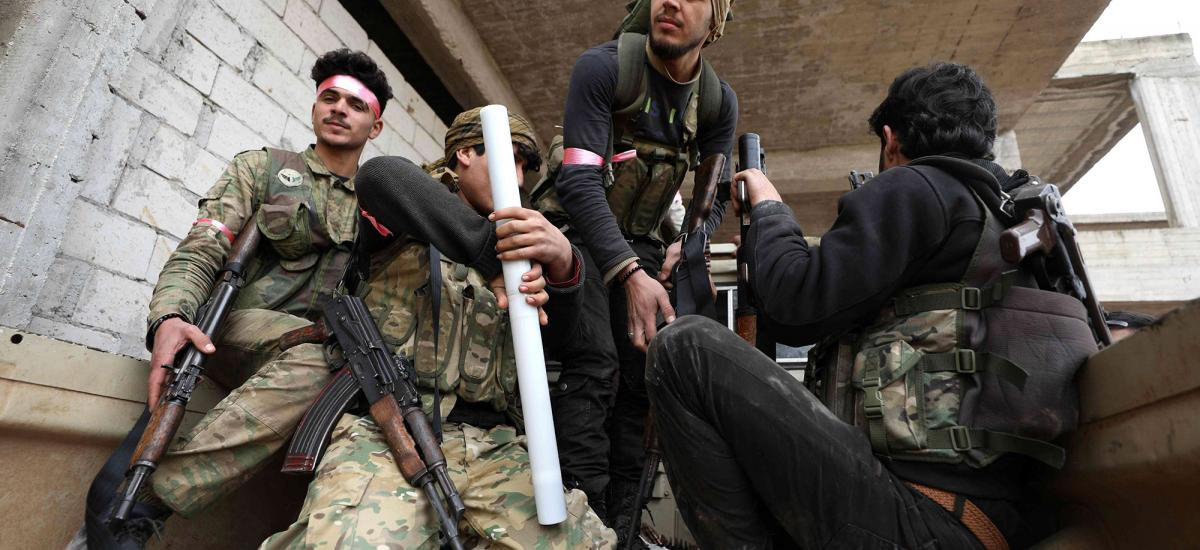
The Turkey-backed Syrian National Army’s (SNA) ranks may include some four percent child soldiers, according to a report released on Wednesday by the Foundation for Political, Economic and Social Research (SETA), an Ankara-based research company known for its close relations with the Turkish government. child soldiers
A Turkish pro-gov think-tank @setavakfi deleted from their website & Twitter a study about the Syrian Turkish-backed factions (SNA), possibly because it accidentally revealed that the factions are recruiting children. My back up of the study: https://t.co/RxA9h23Nkz https://t.co/28nL8n0ulE
— Elizabeth Tsurkov (@Elizrael) November 19, 2020In the report, since deleted from SETA’s website and social media accounts, 7.85 percent of 1,490 fighters declared their age to be between 18 and 20, and 3.66 percent of 1,474 fighters said they had been fighting for two years or less. The survey was conducted in December last year.
Overall, 93.22 percent of fighters said they had been in the SNA for more than three years, and 63.19 percent have been in the SNA for more than seven years.
“The arguments that the foot soldiers are not the same have been disproven by this survey,” said the report.
The responses suggest that some four percent of participants came of age after they joined the SNA, which was established in December 2017 as a collection of Turkey-backed Syrian rebel groups, and it could be the case that underage fighters had been active within rebel groups before they came together as the SNA.
There are between 70,000 and 90,000 fighters in the SNA in total, with 30,000 to 40,000 in the first three legions included in the survey, according to the report.
Lol ~1% or less of the SNA fighters are Kurds. Says a great deal about the Turkish proxy & policy in this regard.
Omer, you say "YPG/YPJ does not enjoy popular support amongst the Kurds of Syria" ? Wow
Where is the pro-SNA Congress attended by thousands? Where is this tribe?😂 https://t.co/GDH5l9xcWX pic.twitter.com/Gee6jlLpMC
— Dr. Diween Hawezy (@DiweenHawezy) November 19, 2020Minors have also been deployed to Azerbaijan and Libya among Turkey’s recruited mercenary groups, according to Centre for Global Policy fellow Elizabeth Tsurkov. child soldiers
Amid accusations by Russia, Armenia and France that Turkey recruited mercenaries from the SNA’s ranks to fight overseas, the survey found 0.58 percent of 1,544 fighters saying their primary motivation was money, and 2.21 percent of 1,539 fighters giving money as their secondary motivation.
When asked about their income, 64.63 percent said their family had a monthly income of 500 lira ($66) or less.
Tsurkov also pointed to the 24.90 percent of respondents who said they had been fighting for “more than nine years,” putting their initiation date to before the protests in Syria devolved into a civil war.
“Kurds, in contrast to the general perception of being the enemy of the SNA, are represented within the SNA,” the report said, as 1.42 percent of 1,548 respondents stated their ethnicity as Kurdish. According to the report, there are Kurdish fighters in nine out of the SNA’s 41 factions.
The report cited “the existence of alternative armed groups other than the SNA for Syrian Kurds and the structural problems between the Kurdish community and the armed Syrian opposition” as reasons for the low percentage of Kurdish fighters in the SNA.
Thirteen percent of Kurds in the SNA said they had been fighting with the group for more than nine years, and only 4.55 percent said they joined less than a year ago. Among the 426 to 568 Kurdish fighters, between 58 and 77 of them joined in the last three years, after Turkey’s major incursions into northern Syria started. There are between 38 and 51 Kurds in the SNA who were aged 18 to 20 at the time of the survey.Nine percent of Kurds said they had “other” reasons outside of the Syrian revolution, homeland defence, money, power or revenge as their primary motivation to join the SNA, and 31.82 percent had “other” reasons as their secondary motivation.
Almost all fighters (97.87 percent) said they believed in the fall of Syrian President Bashar al Assad, but only 49.27 percent believed that a political solution was possible, and 27.12 percent found the efforts coming out of the Astana Process, led by Russia, Iran and Turkey, to be “useful.” child soldiers
Almost all respondents said they found the presence of the United States, Russia and Iran in Syria not useful, ranging between 94.10 percent for the United States and 98.96 percent for Iran, while 86.22 percent of 1,538 respondents said they found Turkish presence in the country useful.
“The survey shows that 13.78 percent of (SNA) fighters do not view Turkey’s presence in Syria as useful,” the report said, adding that some in the SNA “see Turkey as an obstacle in the fight against the Assad regime.”
All Kurdish respondents said they found the Turkish presence in Syria useful.
The report concluded that the SNA is made up of patriotic and revolutionary Arabs who are generally not satisfied with current political efforts, but don’t pose a threat to the territorial and political integrity of Syria, and its fighters, who “cannot be seen as anti-Kurdish per se,” see only Turkey as a positive foreign presence in the country, but the assessment that they are Turkish proxies is “too short-sighted and simplistic.”
 Eurasia Press & News
Eurasia Press & News

